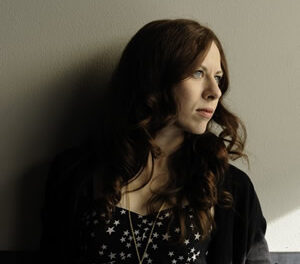“De Profundis” (Latin: out of the depths) is a handwritten letter from Oscar Wilde to his lover, Bosie, or Lord Alfred Douglas. It was written while Wilde was imprisoned in Reading Gaol for “gross indecency,” or, being gay. It took Wilde eighty days to write “De Profundis,” specifically because the doctors only allowed Wilde one sheet of paper each day, and for “medical reasons.” As Wilde reached the end of his two-year prison term, he was hospitalized for an injury he received during his hard labor, but he was not cured of the resulting ailment, and it is what eventually killed him after his release. These handwritten pages, which form the commentary on his life within those walls, are the last words Wilde was to write. The work focuses on his being a convict and what that had taught him.
A theatre piece of the same name based on the work, now showing at PlayMakers Repertory Company under the banner of their PRC2 series, examines Wilde’s letter closely, but it does not actually refer to it except partially. We get smatterings of the work along with the rest of the play, as performed by Nicole Villamil, in a collaboration with creators Brian Mertes (who also directs the show), and Jim Findlay. What has emerged is a creation, not necessarily of a man or a woman, but perhaps a creative being. In her performance, Villamil assumes several different characters, both male and female. But, as she examines these eighty pages of text, Villamil goes through several transformations – not unlike the many different selves Wilde himself felt during his imprisonment. The play, therefore, is more closely inspired by Wilde, rather than being an interpretation of him.
We do get many different passages from those one-page-a-day explorations of soul that Wilde embarked upon. They focus on Wilde’s own plight, his religion, his humanity, and the suffering he felt during this imprisonment. He delves into the text of his New Testament, written, he has found, in original Greek. That Christ has spoken to his children in Greek gives Wilde a substantial boost, because he then deduces that he is reading of Christ in an original form, not, as he put it, “a translation of a translation.” He feels a direct connection, and the rudder it provides him steers him in a new direction.
De Profundis is performed on a very narrow causeway, with a white wall at one end and a ladder of metal at the other. Within this space, Villamil worked her own kind of magic, studying her text, feeling what the words produce in her, and trying to interpret, in a 21st century being, the thought and pain of a 19th century author. This often worked, and sometimes didn’t. There were actions and reactions that sometimes shot past us, rather than into our laps.
As her several different characters progressed, so too did her animus and her own inner being. Villamil changed costumes as her feelings and emotions changed, and these changes did not restrict themselves to one gender or another. Villamil changed from female to male, and from male to a kind of shaman, encompassing both sexes. It was this final transformation that allowed us to hear and study the longest, and perhaps most profound, passage of the evening. Within her shaman role, Villamil sat and read to us from several pages she had taken out of a box, each bearing a paragraph of Wilde’s study on internal growth. (It seems prudent here to note that the pages she read from were actually blank. But, in such close proximity, it seems it would have been wise to have actual words written on those pages.) It was during this final reading that we were best able to completely immerse ourselves in Wilde’s own words, and to draw from his studies our own conclusions on life, both within and without.
Perhaps the best aspect of Villamil’s performance was that, regardless of where the text took her, she remained poised and confident. This was important because, had she shown any indecision at all, it could have been mistaken for performance error. It was her poise that carried her through; a lot of her many machinations seemed somewhat irrelevant. The act of crushing grapes, for example, in her anima phase, or the brief and sexless nudity as she bound her breasts in preparation for her maleness seemed little more than distractions. It was clear that she was attempting to go where Wilde led her, but the path she traveled was not at all times an open one.
In the end, we were left with Wilde. Fortunately. It would be folly in the extreme to leave us any place else. With the donning of the costume of the shaman, Villamil reached her destination. What came next – and last – was an interpretation of Wilde’s own words. We were left with the profundity of this scholar’s last testament. This final examination swept away any possible flaw in the new performance, and let us leave with the words of Wilde ringing in our ears. It was a heady experience.
The show is a fleet one, lasting only 90 minutes without intermission. But within those 90 minutes, you will travel to a number of different places, all under the watchful eye of a nineteenth-century aesthete, as he travels with us through the passages of a colorful, if now dark, eternal soul.
De Profundis continues through Sunday, January 15. For more details on this production, please view the sidebar.











